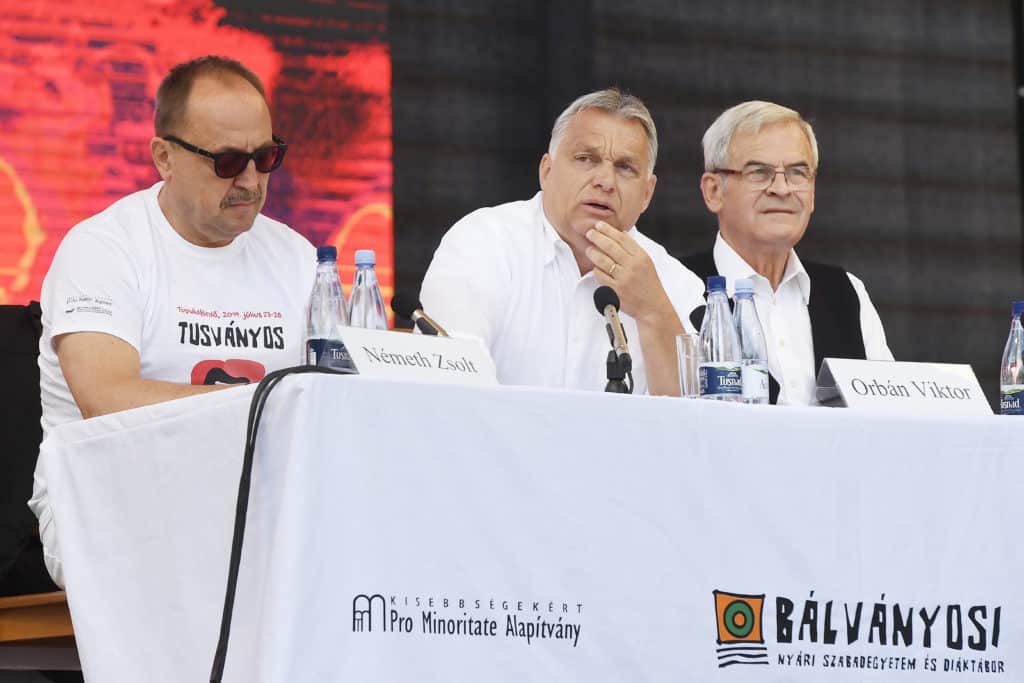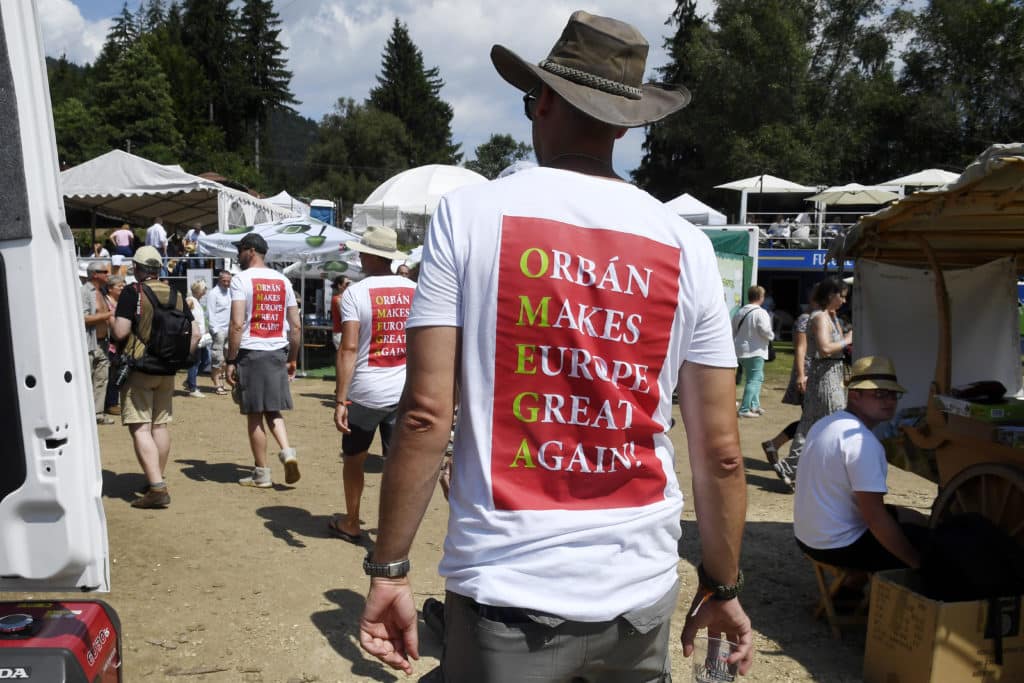Change language:
Orbán: The point of illiberal politics was Christian freedom

The Hungarian nation today has the political and economic means to protect itself and preserve its independence, Prime Minister Viktor Orbán said on Saturday in his annual address at the “Tusványos” summer university.
Soon it will have the physical means to defend itself, too, Orbán told several thousand people gathered at the event held in Baile Tusnad (Tusnádfürdő), in central Romania.
Orbán said the country was on a promising path but dangers to its continued development came not from domestic sources but were external.
Outlining Hungary’s post-communist past, he said that between 1989 and 1991, the task of the transition generation had been secure the country’s freedom and independence. The following four years were about building a capitalist market economy and a democratic legal and political system. Between 1994 and 2010, “the successors to the socialist system and their internationalist helpers” reigned and had then to be defeated, he said. A new community-based national system was then introduced and built, while Fidesz won the two-thirds majority in parliament needed to achieve this, Orbán added.
The prime minister said
his political generation would now be “prime time” for the next 15 years and the most important tasks lay ahead.
Hungary’s government has succeeded in regaining the country’s sovereignty and protecting its borders against migration, Orbán said. The International Monetary Fund “went home”, he added. “Our generation has been given a historic opportunity to strengthen the Hungarian nation,” the prime minister said. “This has been an unfairly hard struggle up until now and will remain an unfairly hard one going forward.”
He said that over the course of the 30 years since the country’s democratic transition, Hungarians had realised that “it’s not about setting a goal for a certain time period, but rather about giving meaning to our own lives within a period of time.”
“This is true not just of individuals but of each generation,” Orbán said, underlining the need for the current generation to “give meaning” to its life.
“Hungary today is on a promising path, its finances in order, the public debt is falling, growth is strong, wages are rising, small and medium-sized businesses are expanding, families are getting bigger, and nation-building is vibrant,” he said.
Orbán said that thanks to complicated maneuvers, US billionaire “George Soros’s man has been prevented from taking over the European Commission and placing his ideological guerrillas in important European positions.”
The prime minister said the commission should act as the guardian of the European treaties.
“Political activism must be stopped,” he said.
“It’s not a political body … its job isn’t to organise political attacks against member states.” “It sets the direction and the strategic decisions are made by the European Council of elected prime ministers,” he added.
Orbán insisted that “errors made in the EU over the last five years” must be corrected, especially in the areas of migration and the economy. The commission should no longer preoccupy itself with migration, he said, adding that a council of interior ministers of Schengen area member states should take over all responsibilities related to migration.
He called for European socialism to be stopped in its tracks and for a competitive European economy to be restored.
“We must support successful economies and reject the idea of raising unemployment benefits at European level,” Orbán said.
Instead, jobs must be created and taxes reduced everywhere, he said, adding that red tape must be cut and investments encouraged in place of austerity policies.
The prime minister said that if the government’s assessment of the European economic outlook turned out to be the case next spring, it would be necessary to draw up a second economic protection plan by then, and possibly a third one in the autumn of 2020. The action plans would have to be geared towards improving the country’s competitiveness, he said, adding that western European economies were not developing well enough to support Hungary’s desired growth trajectory. He said
Hungary must rethink its plans for 2020-2021 in order to minimise external risks and mobilise internal resources.
Speaking about the impending agenda, Orbán said Hungary would be embroiled in a battle of the rule of law, too. He added, however, that Hungary must “hold its nerve” but at the same time “we shouldn’t offend our partners”.
Referring to the Finnish EU presidency, Orbán said: “We will evaluate the state of Hungarian rule of law with our Finnish friends.”
liberal democracies were the natural order in a world pervaded by “a kind of liberal internationalism” leading to the formation of a “liberal empire”.

The prime minister said his political inheritance from the period before 2010 was an apt illustration of the problems associated with liberalism. Less than half of the country’s active population contributed to economic output. Fully 3.6 million people had jobs and 1.8 million people paid taxes, he said, characterising this as “a form of long and uncomfortable suicide.”
“Now, 4.5 million people are in work today and all of them pay taxes,” he added.
Further, the debt situation had been “hopeless” and cultural identity waning, Orbán said. The sense of belonging to a nation had been slipping away and Hungarian communities living beyond the border had struggled to withstand pressure to assimilate. Moreover, the means to protect sovereignty — the police and army — had been degraded, he added.
In 2010, solving these inherited problems within a framework of liberal democracy looked impossible and so something else had to be done, he said.
Orbán argued for preserving the framework of the free market system and democratic legal and political institutions while changing the existing social structures. “In other words, ‘yes’ to democracy, ‘no’ to liberalism,” Orbán said. “We had to rethink and put the relationship between the individual and society on a new footing,” he said.
Orban said the liberal system consisted of a cluster of individuals competing against one another without the existence of a nation. “At best, there’s a political nation,” he said. In contrast to this, he said, the “illiberal or national point of view” sees the nation as “a historically and culturally defined community whose members must be protected and made capable of fending for themselves in the world as a group”. This approach recognises individual performance that also serves the good of the community, he said.
Orbán said that in an illiberal or national system, achievements such as self-care, work, self-sufficiency, paying taxes, starting a family, raising a child, were not private matters but were a reflection of participating in the nation.
Hungary has established itself as an “illiberal state”, Orbán said, adding that the country had been reorganised into a “unique Christian democratic state”.
Orbán argued against the assumption that “all democracies are by nature liberal and Christian democracy must also be liberal”.
He said the idea of liberal democracy had only been viable for as long as it had “a positive effect on humanity” by safeguarding personal freedoms and private ownership.
“But once it started breaking the ties that bind man to reality and life, started questioning gender identity, devaluing religious identity and deemed national affiliation to be redundant, its contents radically changed,” the prime minister said. “This is the zeitgeist of the past 20-30 years in Europe.”
“According to the liberal concept of freedom, you can only be free if you are free from everything that makes you belong; from borders, from the past, from language, from religion and tradition,” Orbán said. Illiberal thinking maintains that the individual’s adherence to freedom must to trump the interests of the community, he added.

The prime minister said the point of illiberal politics was Christian freedom. “Policies geared towards Christian freedom are about working to protect everything that liberals neglect, forget about or despise,” Orbán said. “We are going to spend the next 15 years on the mission of our generation to confront the liberal spirit of the era and liberal internationalism,” the prime minister said, adding that whereas the lay of the land may favour the liberals, “there is something on our side nonetheless that can be said to be beautiful, free and just; something that can be summed up as Christian freedom.”
Orbán said liberals hated illiberals “because they are driven by an imperialist mindset based on exclusivity”.
“They can’t stand a little stubbornness,” he said. If it is shown that there is another form of community organisation, “this reveals the fiction of the doctrine of universal salvation”. “And it’s intolerable if Hungary, Poland, Austria, Italy and the Czech Republic stick to their own views, and they must be hated, because they stand against universal good of humanity.”
The prime minister said it was indeed possible in this liberal age for an EU country with a population of ten of million to climb out of debt, to restore economic sovereignty, to develop faster than liberal democracies, to successfully reject migration, to protect the family and culture, to promote national unification and nation-building, and to form the conditions for Christian freedom. “But this requires courage and unity,” he said.
Source: MTI








We are coming to work and live in Hungary and Orban’s opinion in this article is a welcome relief that we will be within a nation that is encouraging, rather than hindering, our Christian views. We look forward to a rewarding experience and hope that all Hungarians will be blessed by God.
It seems only Orban is Christian. All the other Hungarians I know in Veszprem are atheists